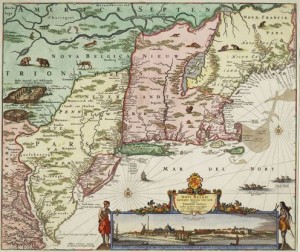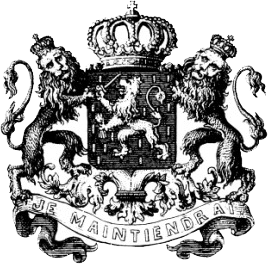New Netherland Seminar: Emerging Scholars Roundtable
 In July, the New Netherland Institute invited me to participate in its new Emerging Scholars Roundtable. The roundtable will foster interaction between graduate students, junior scholars, and established scholars. I jumped at the opportunity to participate because my dissertation-to-book revision project extends my period of study backward to 1615. As a scholar of Revolutionary and Early National America, I need all the advice I can get about New Netherland.
In July, the New Netherland Institute invited me to participate in its new Emerging Scholars Roundtable. The roundtable will foster interaction between graduate students, junior scholars, and established scholars. I jumped at the opportunity to participate because my dissertation-to-book revision project extends my period of study backward to 1615. As a scholar of Revolutionary and Early National America, I need all the advice I can get about New Netherland.
Emerging Scholars Roundtable
The Roundtable will take place on October 4, the day before the Annual New Netherland Seminar (October 5). Ruth Piwonka, Jaap Jacobs, Firth Fabend, David W. Voorhees, Janny Venema, Charles Gehring, and Walter Prevenier will serve as the panel of established scholars.
The emerging scholars submitted 5-7-page project descriptions to the roundtable participants. The descriptions outline each emerging scholar’s area of research and the conceptual and/or research problems they face.
 My Proposal
My Proposal
What did I put in my proposal?
I asked the established scholars for assistance with the first chapter of my book.
In my first chapter, I will discuss the characteristics of the New World Dutch identity created by the people of Beverwyck (Albany, pre-1664). Roughly 51% of the colonists in New Netherland were born in the Netherlands, the remaining 49% came from all over Europe. Many scholars use “Dutch” to describe the 7,000-8,000 colonists who settled in New Netherland. I have never been comfortable with that.
New Netherlanders were Dutch in the sense that they lived under Dutch authority, but culturally they comprised something different. Wherever they settled, New Netherlanders created community identities that allowed them to avoid cultural disputes. In the case of those who settled in Beverwyck, the colonists developed highly adaptable self-understandings that allowed its diverse population to live and trade with each other and the Native American peoples who lived around them.
The secondary-source literature states that Dutch culture inalterably changed the cultures of Native Americans and non-Dutch colonists. Dutch culture profoundly influenced the self-understandings of the people of Beverwyck. However, the culture of Native Americans and non-Dutch colonists also inalterably changed the culture of the Dutch colonists. The secondary-source literature does not discuss these cultural contributions.
 My Book
My Book
In my book, I would like to mention how Native Americans and non-Dutch colonists affected the creation of New World Dutch cultures. Admittedly, this topic deserves more than a mention and could fill many dissertations and books.
I hope to gain ideas from the scholars on the roundtable about the cultural contributions Native Americans and non-Dutch colonists made to New World Dutch cultures.
Understanding these contributions is crucial because New Netherlanders handed down a flexible culture that informed how the people of Albany adapted old self-understandings to create new self-understandings as New Yorkers, Britons, and citizens of the United States.